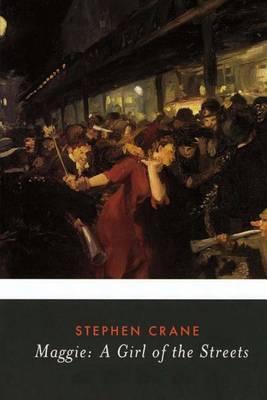
This edition reprints the first published version, that of 1893.
Misprints and errors have been corrected and are identified in "A Note on the Text." Footnotes indicate changes in wording Crane made for the 1896 edition and explain slang expressions and customs of the day. Maps of the novel's New York City locales are also provided.
"Backgrounds and Sources" includes nonfictional accounts of urban life by Jacob Riis and others from which Crane drew, as well as discussions of Crane's literary sources
"The Author and the Novel" traces the history of the novel's composition and revision.
Contemporary American reviews of the 1893 Maggie and American and English reviews of the 1896 edition focus on the historical importance of the work, the values and tastes of the 1890s, and Crane's modernism.
The modern critical essays are by John Berryman, Charles Child Walcutt, William Bysshe Stein, Joseph X. Brennan, Janet Overmyer, Donald Pizer, Joseph Katz, Eric Solomon, Jay Martin, Donald B. Gibson, Arno Karlen, Katherine G. Simoneaux, Frank Bergon, Hershel Parker, Brian Higgins, and Thomas A. Gullason.
Maggie is exactly the kind of book I normally wouldn't like, and one that I think doesn't adhere to the structural conventions most contemporary readers expect of books. As a naturalist book\, it attempts to show how humans are shaped by their surroundings--in this case, a New York tenement--and strives to create a sense of realism with short, impressionistic chapters that don't show any real overarching connections between characters. This means that characters are introduced, are dropped, sometimes come back, sometimes don't. Unity of structure and a clean character arc are not necessarily the goal. And while I hate when this type of writing is done poorly, I think Stephen Crane does it pretty well.
The story very clearly shows how Maggie's eventual downfall is a direct cause of her surroundings. Her parents fight all the time; the tenements are a place of dirt and violence. Maggie longs for something better, and doesn't necessarily see the problem of staying out with a man, when he's offering something that seems a step above what she's used to. When Maggie's mother wails that she didn't raise Maggie to be such a wicked girl, readers can see the irony. Maggie's mother barely did any "raising" at all; of course Maggie didn't naturally intuit some sense of morals or social convention.
The story isn't moralizing, however, as one might expect. Though the causes of Maggie's descent into prostitution are clear, Crane isn't really judging here. He's not judging Maggie, and he's not judging the people who could have helped her but chose not to. It's a simple portrayal of what life might be life for people in a situation like Maggie's, and it's pretty compelling.
Reading updates
-
Started reading
-
2 April, 2016:
Finished reading
-
2 April, 2016:
Reviewed
